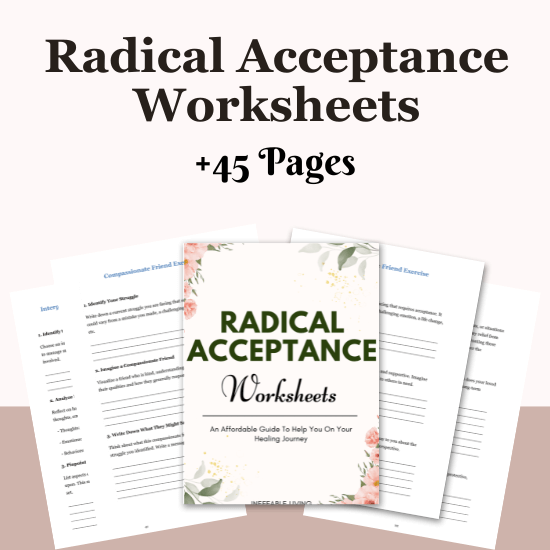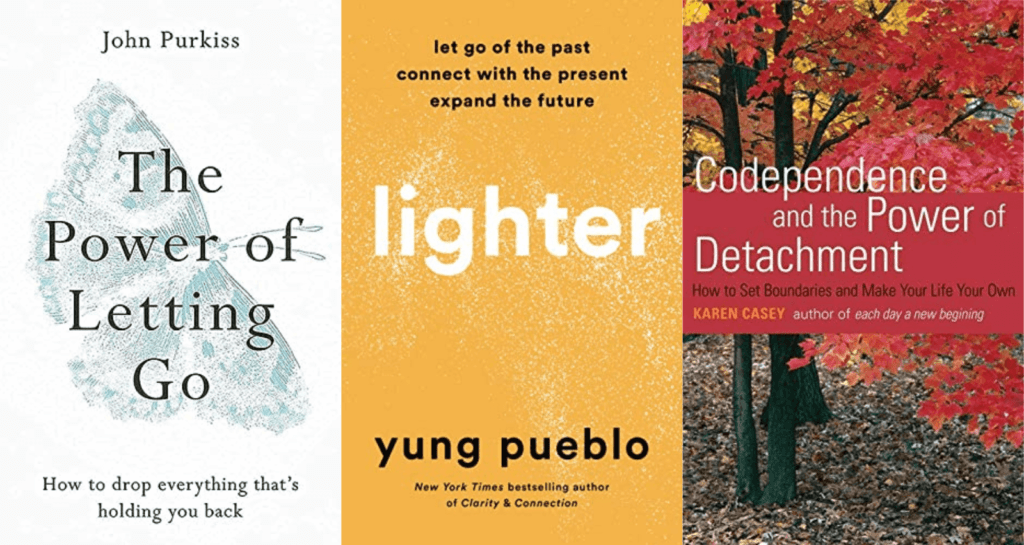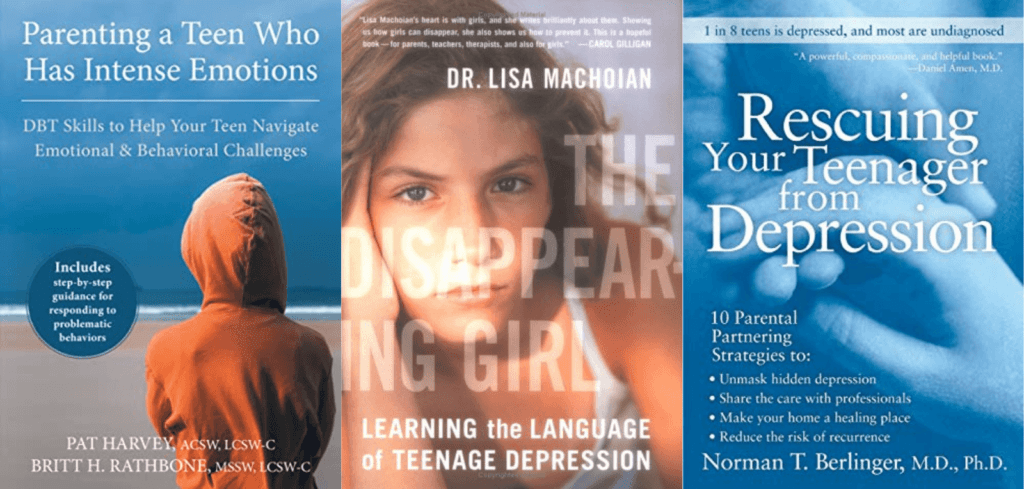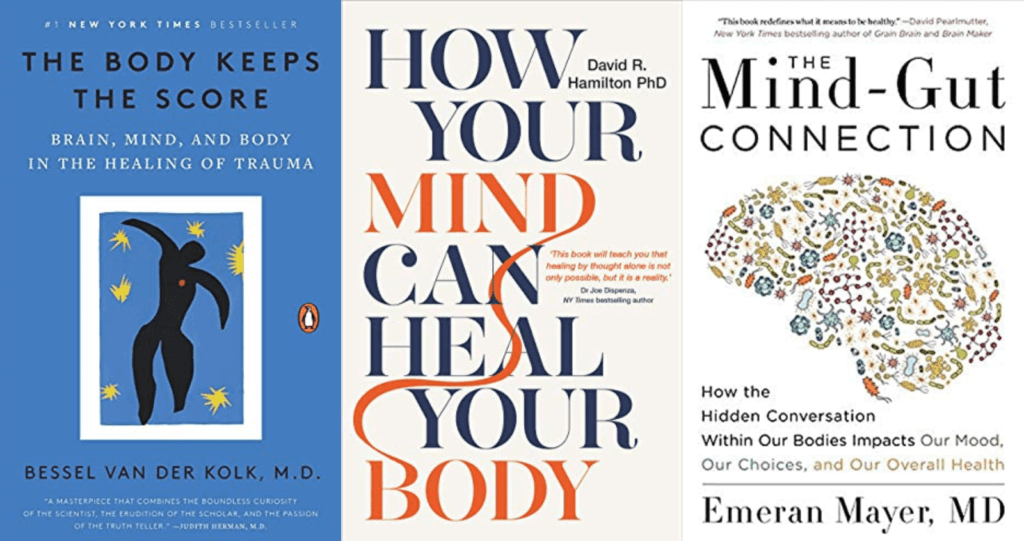The following are some of the best books on detachment to help you let go and free yourself.
- What Is Detachment?
- Books On Detachment
- 1. Lighter: Let Go of the Past, Connect with the Present, and Expand the Future
- 2. Letting Go: The Pathway of Surrender
- 3. The Power of Letting Go
- 4. Let Go Now
- 5. Codependence and the Power of Detachment
- 6. Detachment: The Art of Letting Go While Living With an Alcoholic
- 7. Let Go: 60 Powerful Truths to Set Your Heart Free
- 8. The Power of Now
- 9. Full Catastrophe Living
- 10. A Time for Wisdom
- How Books On Detachment Can Help
- Conclusion
Disclosure: Some of the links below are affiliate links. This means that, at zero cost to you, I will earn an affiliate commission if you click through the link and finalize a purchase.
What Is Detachment?
Detachment is a state of emotional distance or disconnection from a person, situation, or outcome.
It involves consciously choosing not to become overly attached or invested in the outcome or opinions of others.
Detachment allows you to observe things objectively, without judgment or excessive emotional involvement.
It can be a healthy way to protect yourself from getting too caught up in the ups and downs of life, as it helps you maintain a sense of inner peace and balance.
Detachment does not mean you don’t care; instead, it means that you acknowledge and accept things as they are, without allowing them to control your thoughts and emotions.
Books On Detachment

1. Lighter: Let Go of the Past, Connect with the Present, and Expand the Future
By Yung Pueblo
In Lighter, yung pueblo demonstrates how we can all move forward in our healing, from learning self-compassion to letting go to becoming emotionally mature. As the heaviness falls away, our minds will finally stop feeling overburdened with tension and we’ll be able to reconnect with the present. And the world around us will hopefully become more inviting in crisp and newly vibrant ways. But these are just the first steps. As we grow stronger and expand our self-awareness, it’s our responsibility—and also part of the healing journey—to take actions to support the health and harmony of all people.
The final section of Lighter shows how we can and must contribute to building a world that is no longer structurally harmful but, instead, structurally compassionate.
Related: Top 70 Detachment Quotes To Help You Let Go

2. Letting Go: The Pathway of Surrender
By David R. Hawkins M.D. Ph.D
This book provides a mechanism for letting go of those blocks. The mechanism of surrender that Dr Hawkins describes can be done in the midst of everyday life. The book is equally useful for all dimensions of human life: physical health, creativity, financial success, emotional healing, vocational fulfillment, relationships, sexuality and spiritual growth.
Related: Best 6 Ways to Let Go of Wanting to Control Everything

3. The Power of Letting Go
By John Purkiss
The Power of Letting Go brings together a number of key principles that come up for anyone who is on the journey of self-enquiry and development. At some point, the choice becomes clear, whether to hold on or let go.
This book combines both the why and the how to let go, with excellent practices that help convert the desire into action.
Related: Top 7-Day Acceptance Challenge For A Peaceful Life

4. Let Go Now
By Karen Casey
Inside, you’ll find gems of insight for every stage of your codependence recovery journey. Through 200 recovery meditations and reflections, Casey explores how to set boundaries, control emotions, face attachment issues in adults, and more. Inspirational and easy to read, Let Go Now guides us away from taking care of others, and toward taking care of ourselves.
If you’re looking for a codependent book or an attachment book—like Melody Beattie books, The Power of Letting Go Codependent No More, or The Language of Letting Go book—you’ll love Let Go Now.
Related: Top 25 Tips On How To Set Boundaries In A Toxic Relationship? (+FREE Worksheets PDF)

5. Codependence and the Power of Detachment
By Karen Casey
Karen Casey, bestselling author of Let Go Now and Each Day a New Beginning, knows what it feels like to live a life of codependency, and she’s here to help. In Codependence and the Power of Detachment, Karen shares her story and the story of others who have suffered from codependency, from her experience with Al-Anon and elsewhere. And she shows you how they were able to detach themselves from their unhealthy codependency, leading to more positive relationships and a less stressful life.
Related: How To Overcome High Functioning Codependency?

6. Detachment: The Art of Letting Go While Living With an Alcoholic
By Evelyn Leite
The feelings of anger, shame, and guilt associated with family alcoholism come from the constant confusion, conflict, unpredictability, inconsistency, mistrust, and sense of failure that each member experiences. The family victims seldom learn without outside help that they didn’t cause the disease and that they can’t control it. This book discusses all these issues in depth.
Related: Caregiving vs Caretaking (The Savior Complex)

7. Let Go: 60 Powerful Truths to Set Your Heart Free
By Katy Fults
In this powerful devotional, Katy Fults (well-known hand letterer and founder of Katygirl Designs) offers 60 devotions on how to let go of all that holds you back from a free life with Christ Jesus.
Related: Top 21 Codependency Journal Prompts

8. The Power of Now
By Eckhart Tolle
In The Power of Now he shows readers how to recognize themselves as the creators of their own pain, and how to have a pain-free existence by living fully in the present. Accessing the deepest self, the true self, can be learned, he says, by freeing ourselves from the conflicting, unreasonable demands of the mind and living present, fully, and intensely, in the Now.

9. Full Catastrophe Living
By Jon Kabat-Zinn
The landmark work on mindfulness, meditation, and healing, now revised and updated after twenty-five years.
Based on Jon Kabat-Zinn’s renowned mindfulness-based stress reduction program, this classic, groundbreaking work—which gave rise to a whole new field in medicine and psychology—shows you how to use medically proven mind-body approaches derived from meditation and yoga to counteract stress, establish greater balance of body and mind, and stimulate well-being and healing.

10. A Time for Wisdom
By Paul T. McLaughlin, Mark R. McMinn
A Time for Wisdom is for readers who feel beleaguered by the incivility of the modern world, dispirited by its coarse rhetoric and toxic partisanship. It is an invitation to escape the shallow cacophony and restore peace and perspective to our daily lives. Written by two psychologists, the book takes the best scientific research on wisdom and integrates it with timeless concepts that have, for ages, guided troubled souls through life’s hardships.

How Books On Detachment Can Help
Books on detachment can be immensely helpful in various aspects of life. Here are a few ways they can assist:
1. Understanding the concept: Books on detachment provide a deeper understanding of what detachment truly means. They explore the idea of letting go, practicing non-attachment, and finding inner peace amidst the challenges of life. By reading these books, you can gain clarity and become more aware of how attachment affects your thoughts, emotions, and actions.
2. Emotional well-being: Detachment books often discuss how to release attachment to outcomes, relationships, and material possessions. This understanding can help you navigate difficult emotions such as anxiety, stress, and fear. Learning to detach can promote emotional stability and resilience, allowing you to respond rather than react to challenging situations.
3. Developing healthier relationships: Detachment is not about disconnecting from others; it is about establishing healthy boundaries and reducing codependency. Books on detachment teach you how to maintain your individuality while also fostering meaningful connections. They offer guidance on nurturing relationships based on mutual respect, trust, and personal growth.
4. Letting go of the past: Many books on detachment explore the concept of releasing attachments to past experiences, regrets, and traumas. They provide practical tools and exercises to help you let go and move forward. By practicing detachment, you can free yourself from the burdens of the past and create space for personal growth and happiness in the present.
5. Self-discovery and personal growth: Detachment books often encourage introspection and self-reflection. They provide methods for self-discovery, meditation, mindfulness, and self-awareness. By applying the principles discussed in these books, you can embark on a journey of personal growth and development, leading to greater self-understanding and fulfillment.
Conclusion
Remember, reading books on detachment is just the beginning.
Applying the knowledge gained from these books in your daily life is key.
Take your time, be patient with yourself, and enjoy the process of learning and growing towards a healthier, happier, and more balanced life.



